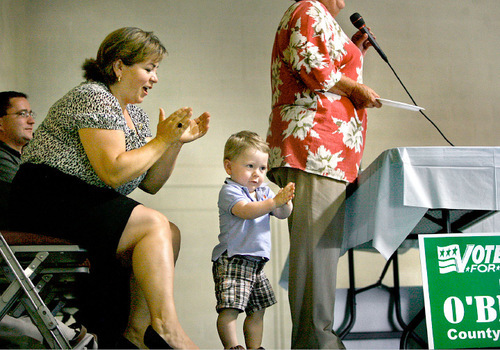This is an archived article that was published on sltrib.com in 2010, and information in the article may be outdated. It is provided only for personal research purposes and may not be reprinted.
California Rep. Linda Sanchez called on Utah Latinos Saturday to mobilize support for immigration solutions made at the federal rather than state level.
"If we lose, we have no one to blame but ourselves," the Democratic U.S. representative from southeastern Los Angeles County told about 30 people at Salt Lake City's Centro Civico Mexicano. The two-hour speech and question-and-answer session was hosted by the Utah State Hispanic Democratic Caucus.
Sanchez, who joked that she considered wearing a bulletproof vest in conservative Utah, said Arizona's effort to tackle immigration is racist, unconstitutional and encourages racial profiling of Latinos. Arizona Senate Bill 1070 makes it a misdemeanor for anyone to be in Arizona without carrying the required documents, among other measures. However, a federal judge blocked key provisions of the law before it took effect.
Comprehensive federal reform will require Republicans to work with Democrats to find solutions to what has emerged as a major issue as mid-term elections approach, she said.
She also took time after her speech to clarify a controversial comment she reportedly made in June that inflamed conservative media and the blogosphere. During a speech to a Long Beach, Calif., Democratic club, Sanchez was quoted as saying Arizona's law was supported by white supremacists.
On Saturday, Sanchez said she was misquoted and that she said that the man who drafted Arizona's law had ties to white supremacists, and that the law definitely had "racial overtones."
Arizona Rep. Russell Pearce, a lead sponsor and author of SB1070, has drawn fire for sending an e-mail to supporters in which he copied an article by a white separatist group, as well as associating with white supremacist J.T. Ready, according to The Arizona Republic. He has since apologized for the former, and of the latter, said he didn't know about Ready's racist activities.
Sanchez was in Utah to support cousin Maria O'Brien's campaign for Salt Lake County recorder. In tow was Sanchez's 15-month-old son Joaquin, who toddled near tables hawking T-shirts and buttons that read "I Could Be Illegal."
Sanchez said her husband is of Irish descent, and that despite many undocumented Irish immigrants working in the Northeast, politicians aren't calling for them to be deported.
During the question-and-answer session, many audience members expressed concern about state Rep. Stephen Sandstrom's draft legislation that requires local police to enforce federal immigration law.
"Immigration has gotten too political and emotional," said Tony Gamonal, of Salt Lake City. "Let's calm down and find some sensible solutions."
Supporters of Sandstrom's proposal say allowing local police to enforce immigration laws is no different than enforcing any other law. They believe that the state would save money by not educating children who are undocumented immigrants and wiping out fraud from entitlement programs. The rule of law is necessary, supporters say, and the feds aren't enforcing the law.
Sanchez shared stories from her state, including one about California Proposition 187, a 1994 ballot initiative designed to prohibit undocumented immigrants from using health care, public education and other social services in the state. California voters approved the ballot measure, though it was later found unconstitutional. But it was at that point Latinos realized they needed to organize and step up efforts to halt state-sanctioned discrimination.
Gamonal appreciated Sanchez's perspective, and said he wished some of his representatives held her views. Instead, he said, "we're importing [ideas] from California."
Salt Lake City activist Archie Archuleta, chairman of the Utah Coalition of La Raza, protested what he called the "hate-mongering" surrounding the issue in legislative circles and said he, too, applauded Sanchez's perspective on what the federal government is doing to bridge divides. "It gives us a lot of impetus and tells us we're not alone," he said.
But the crowd's frustration was apparent: Some were upset by the bureaucratic gridlock and feel ignored by their representatives. "The process is too slow," said Michael Romero, of Murray. "I don't think we're big enough here to have enough clout. We need to do some coalition-building with national groups."
Sanchez told the crowd that if they feel snubbed by elected representatives they should try embarrassing them. She told a story about a veteran in California who felt ignored by his congresswoman, so he picketed her field office with a sign that said the representative didn't care about veterans. He was immediately brought into the office to speak to his representative, she said.
Romero had one suggestion. "We've had too many summits," he said. "We have to go to the ballot box, but we need to go further."



